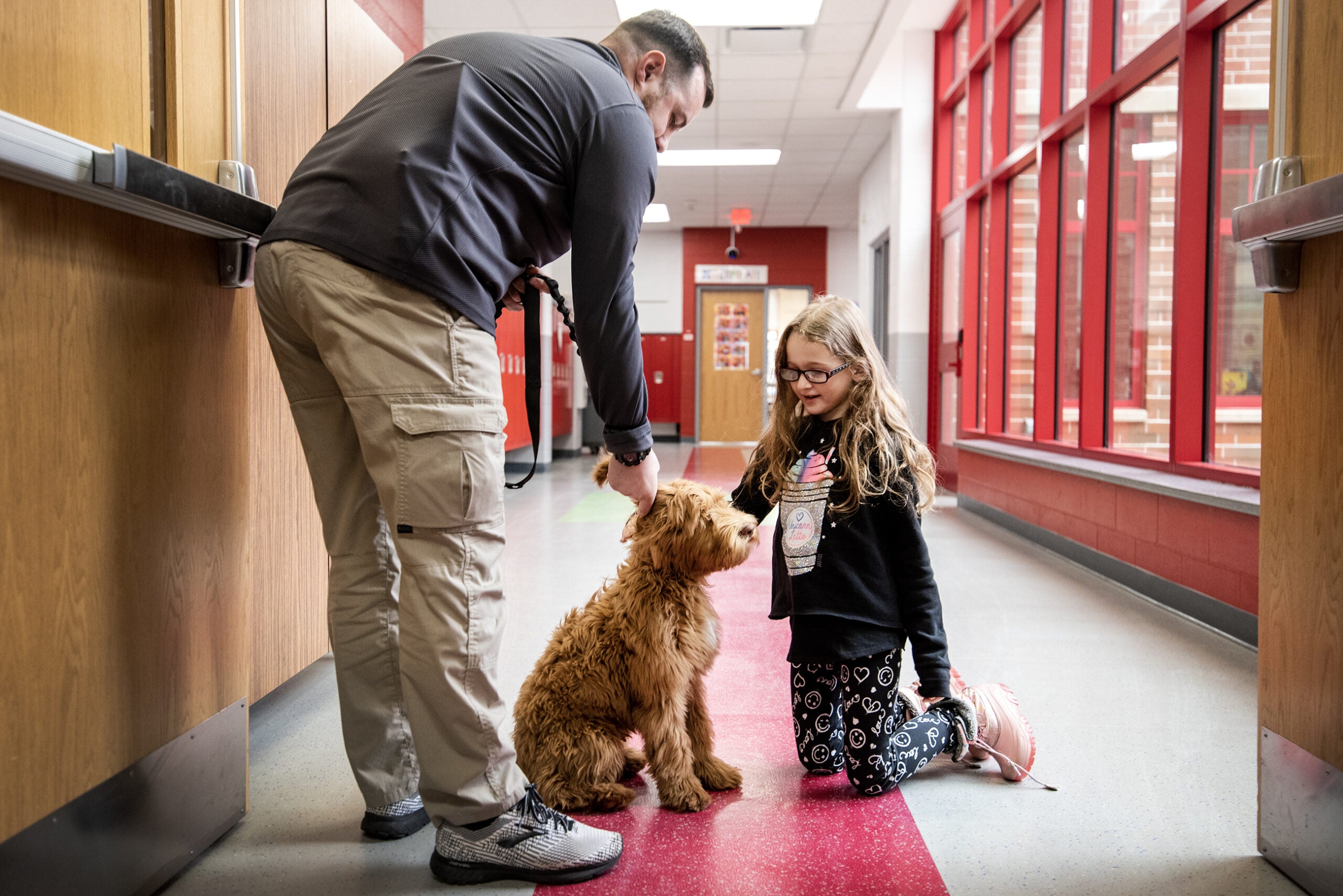As soon as Officer Ryan Ledvina and labradoodle puppy Cheddar enter the kindergarten classroom, students gasp in excitement. The fluffy, orange-brown pup is only 5 months old. As he makes his way around their circle on the carpet for pets and a few puppy kisses, the students giggle and start up a chorus of “aww”s.
One student asks Ledvina, “Are you an officer?”
Ledvina is the resource officer assigned to La Crosse’s Northside Elementary School, and Cheddar is his new partner. As the La Crosse Police Department’s new therapy-dog-in-training, this sort of interaction is exactly what Cheddar is here to do.
Stay informed on the latest news
Sign up for WPR’s email newsletter.
Police departments have been employing dogs since at least the 1960s, when departments used the animals to break up civil rights and political protests. Today, police use dogs to sniff out drugs and other substances, apprehend fleeing suspects and even locate missing people.
But a new generation of police dogs has a different role. When fully trained as a therapy dog, Cheddar will help calm people who are in the middle of a mental health crisis or comfort victims of a crime. The dog may also help Ledvina and other officers make more positive connections with the people they’re meant to serve.
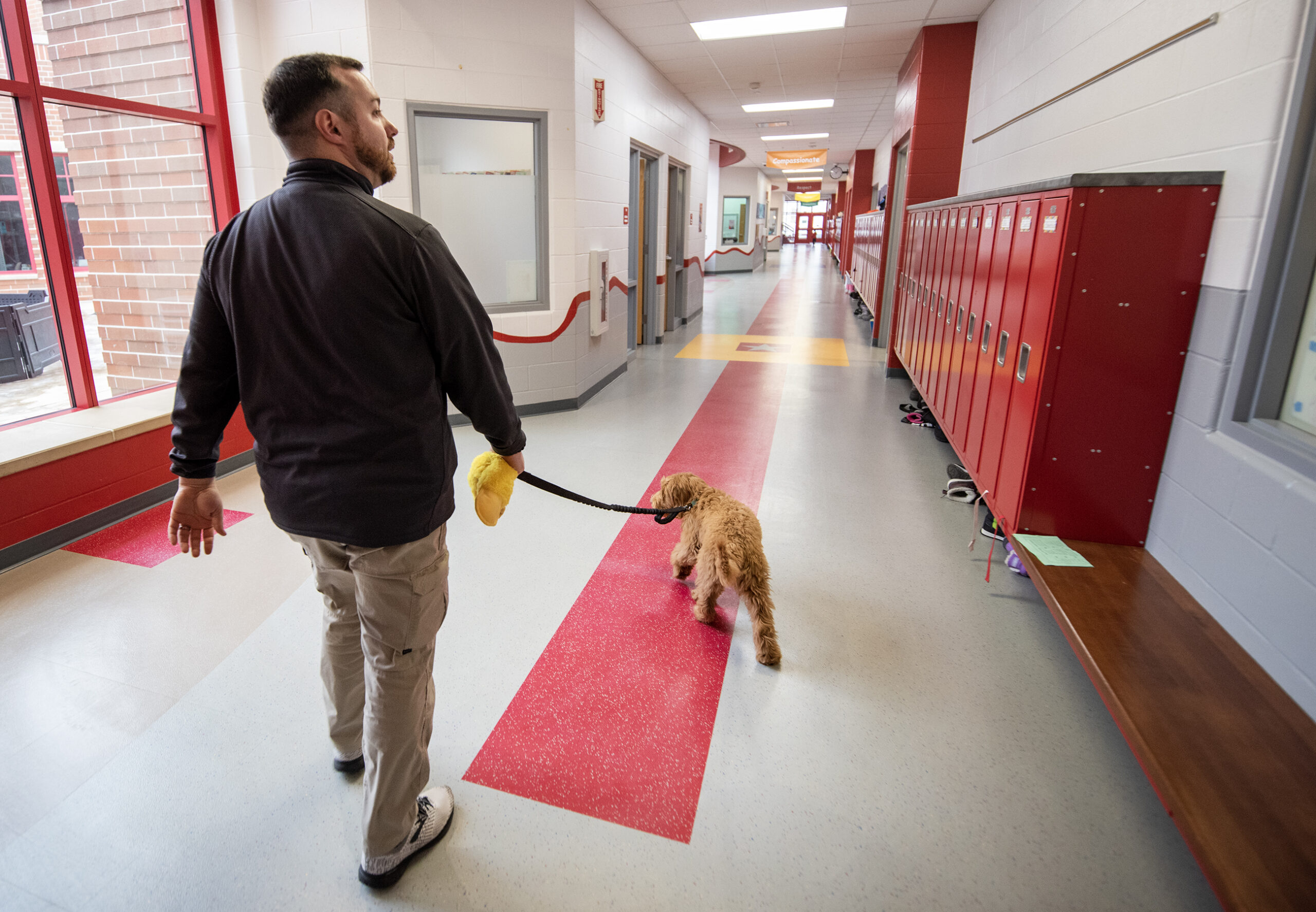
As more police departments consider the ways they are responding to community needs, the number of police-employed therapy dogs is also growing. La Crosse is one of at least eight departments in Wisconsin that added therapy dogs just within the last year. Police Chief Shawn Kudron said the idea came out of staff discussions about how the department could better serve the community.
“We wanted to find a way to bring comfort to individuals who might be suffering, whether that’s through victimization, whether that’s through maybe a mental health crisis, or just having a rough go of it,” Kudron said. “We wanted Cheddar to be able to assist in those situations, maybe help bring a calming nature to the situation so that we as police officers could better help them.”
A growing field of research shows that therapy dogs can positively affect a person’s mental and physical health. A study published last year by researchers in England found that elementary students who interacted with a therapy dog twice a week had “significant stress reduction following the interventions.” The students’ stress levels also did not increase over the school term, compared to their peers in the control group, who “showed significant rises in baseline cortisol levels from beginning to end of school term.”
Colleen Dell, a sociology professor at the University of Saskatchewan, studies the connection between humans and animals. She said it’s clear that interacting with a therapy dog can reduce stress and improve a person’s physical and mental wellbeing. But Dell said researchers are still working to figure out exactly how that happens.
“I always say: dogs allow us to be present and in the moment,” she said. “(They lend an) ability to be present, away from whatever traumatic event you were just in.”
While a service dog undergoes special training to support a person with a disability, Dell said a therapy dog is a pet that naturally enjoys being with people and goes through basic training on how to interact in therapeutic settings. She said these dogs can also help build trust, or the “therapeutic alliance,” between a person and a counselor or other provider.
“If that dog shows it likes me and I’m safe, you’re probably going to think I’m safe, as well,” Dell said.
Ledvina said Cheddar has jumped right into his new role, even though he isn’t old enough yet for therapy dog training. During his second week visiting schools, the puppy helped a student who was upset and was not responding to school staff.
“(Cheddar) approached that student and showed compassion and was able to de-escalate (the student),” Ledvina said. “That opened the door for us to communicate once that student was calmed down.”
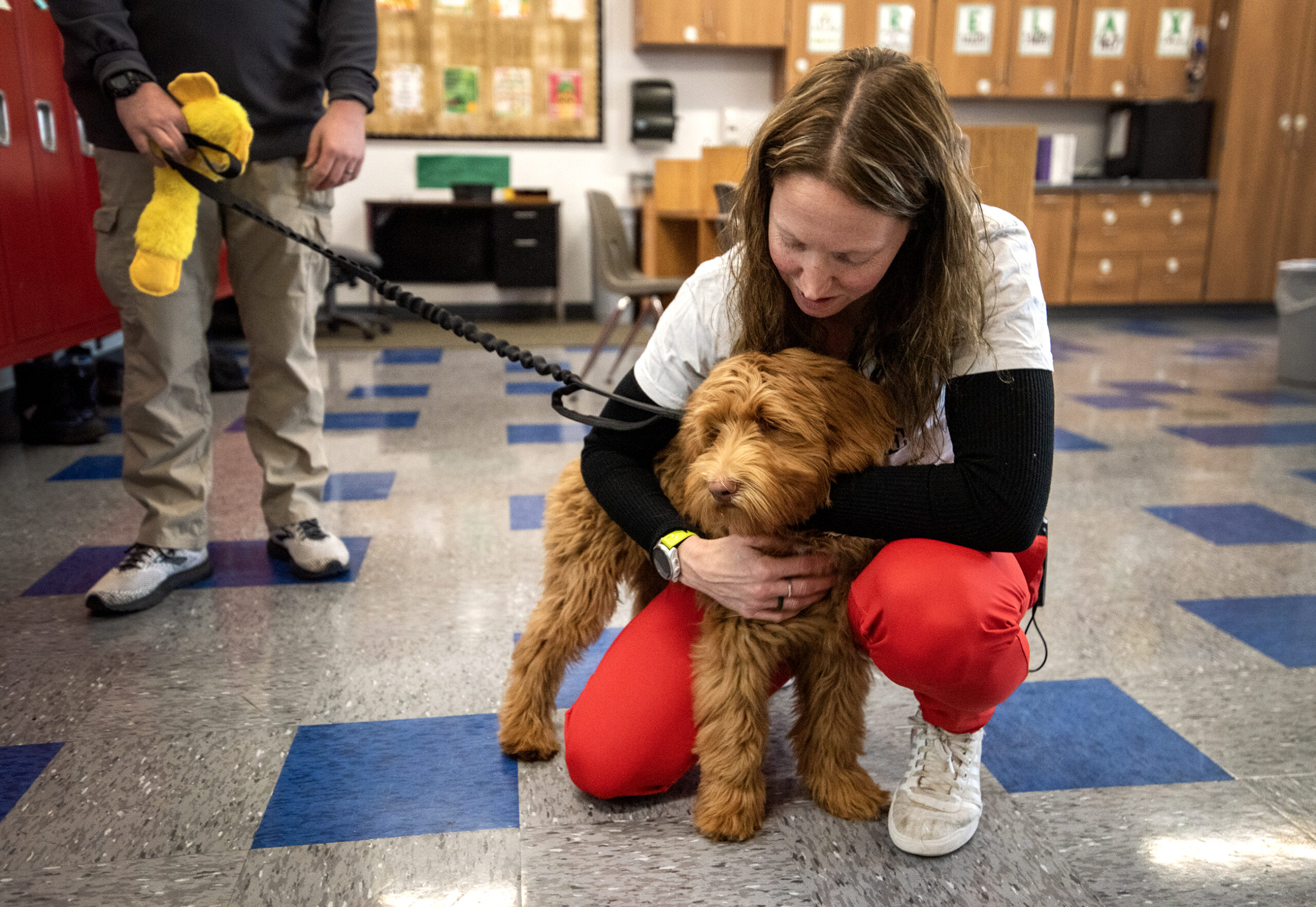
Police leaders expect more agencies to join the growing trend
In Oshkosh, police added a therapy dog last year as a response to behavioral health-related calls in the community and as a way to support the department’s officers. Chief Dean Smith, who is also president of the Wisconsin Chiefs of Police Association, thinks many departments have been inspired by the way therapy dogs have been used to help military veterans with post-traumatic stress disorder, or to comfort police officers when a colleague dies on duty.
“We have to find different ways to solve problems within our communities and using different tools available to us,” Smith said.
As departments across the state and country change their approach to people experiencing a mental health crisis, Smith said he thinks more law enforcement will look to therapy dogs as part of their response.
Roughly 8 percent of police calls in Oshkosh have a mental health component, Smith said, whether it’s someone who has gone through a traumatic event or a person dealing with mental illness. But across the country, an estimated 20 percent of police calls are related to a mental health and/or substance abuse crisis, according to reporting by NPR.
For many agencies, the dogs are funded primarily through community donations. Smith’s department got their therapy dog, a golden retriever named Magic, through a nonprofit where inmates at Oshkosh Correctional Institution train therapy dogs.
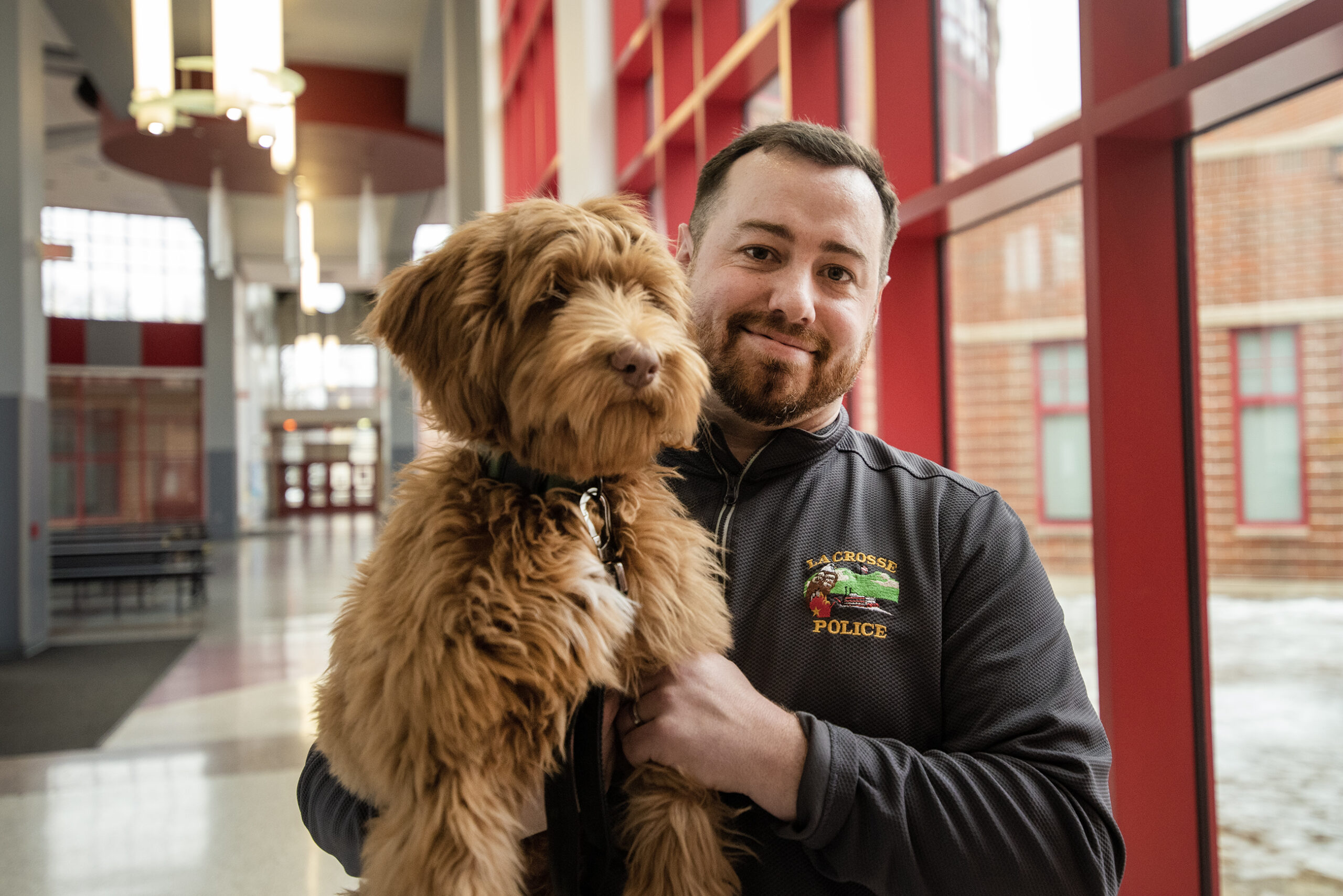
In La Crosse, Kudron said Cheddar was donated by Blueberry Cottage Labradoodles, a kennel in western Wisconsin that’s provided seven other therapy dogs to Wisconsin law enforcement agencies. He said a local dog trainer donated Cheddar’s obedience and therapy training, and the department was able to apply for a grant to cover items like a kennel and training aids.
The use of therapy dogs could also help police officers create positive interactions with community members instead of just responding to a person’s worst moments.
Kudron said he’s hoping Cheddar can serve as an ambassador for officers, especially with residents who may not feel comfortable approaching an officer.
“That is just another resource for us to share with our community and to break down barriers when it comes to just interacting with anyone, to understand who we are as a department,” he said. “Cheddar kind of helps humanize us as officers, when we’re interacting with really anybody in the community.”
Kudron acknowledged that there has been increased scrutiny of police in recent years, especially in the wake of the 2020 killing of George Floyd in Minneapolis and the wave of racial justice protests that followed, including across Wisconsin. In La Crosse, some community members called for ending the school resource officer program in 2021 after a school district report found “markers of the school-to-prison pipeline are present” in the district and the city’s SRO program “is staffed and funded at a higher rate than other comparable school districts.” The La Crosse School Board decided that year to reduce the number of SROs within schools from five officers to two.
Kudron said getting Cheddar was not a direct response to this scrutiny. But he believes the new program highlights the value officers can bring to schools and the community.
“We continue to try to understand the best resources possible to serve that population,” he said. “The children of this community are our future. There are times when there are struggles within the school building or within their lives that are then brought to school, and we felt if a therapy dog could assist in that area, then it’s worth it.”
Wausau officer says therapy dogs can help keep students out of crisis
After almost six years of working with his dog, Badge, Wausau Police Officer Nick Stetzer said he is confident investing in these partners with paws is worth it for any department.
Stetzer, who is a school resource officer at Wausau East High School, said he started seeing a growing number of kids requiring emergency detentions, where a student is taken into protective custody after making suicidal comments or sharing a plan to commit suicide. The need prompted him to look at ways he could help these students feel more comfortable during what he knew could be a traumatic experience.
“I don’t know what it is, but talking to me with a dog is way easier than talking to me as a police officer without having the dog,” he said. “Just as soon as he walks in the room, you can tell people act differently. They’re more willing to be open with the dog.”
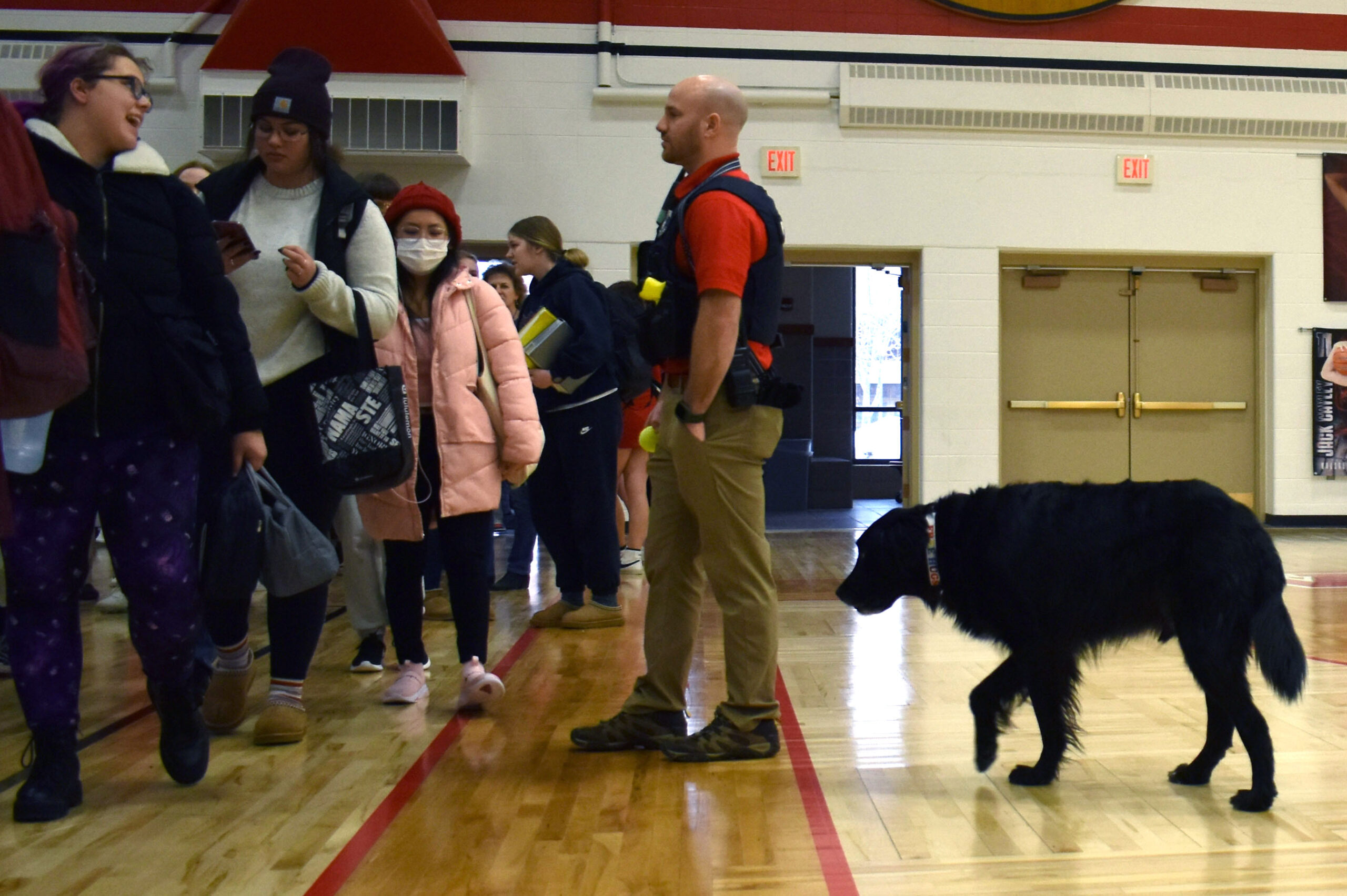
Since bringing Badge on board in 2017, Stetzer said he’s found that kids who are struggling can also benefit from spending time with the dog before they reach a crisis point. A game of fetch with the flat-coated retriever might create an opportunity for him to bring up tough questions and find out what resources a student needs.
But Stetzer said getting the Wausau Police Department on board was a challenge at first.
“I pitched it numerous times to the police department. And I think one of the arguments was, ‘Well, you just want to bring your dog to work every day,’” he said. “Doing a lot of research, it was kind of hard to find statistics as far as how beneficial a therapy dog is and what exactly they do for each person.”
Stetzer ended up putting his personal dog Badge through therapy training on his own. After pitching the idea to department leadership for a third time, Stetzer said he was able to convince them to give the flat-coated retriever a trial run among the department staff.
“We had office staff members, we had police officers come up to Badge and were playing with him, throwing the ball and stuff like that,” he said. “We decided, after seeing that, we were going to give it a shot and do a pilot program at the police department within the schools. And the first day that he started in the school, we had hundreds of kids come up to Badge, pet him and play with him.”
After that, Wausau police leaders and school officials were convinced. The department added another therapy dog, a labradoodle named Theo, at Wausau West High School the following year. Stetzer said departments across the country have called him to learn more about how he uses Badge in the school and how their departments can get started with their own therapy dogs.
Stetzer said interest in police therapy dogs has grown much more than he expected. He’s confident his department will continue the program even after Badge hangs up his leash. At almost 9 years old, Stetzer said Badge is getting close to the typical retirement age for police canines.
“We’ve had some students ask if he can walk across the stage with them when they’re a senior, and that’s three years away. So I don’t know if that will happen,” Stetzer said. “He’s slowing down a little bit. He’s still doing really good work, but I want to make sure he’s comfortable and taken care of as well.”
Wisconsin Public Radio, © Copyright 2024, Board of Regents of the University of Wisconsin System and Wisconsin Educational Communications Board.

